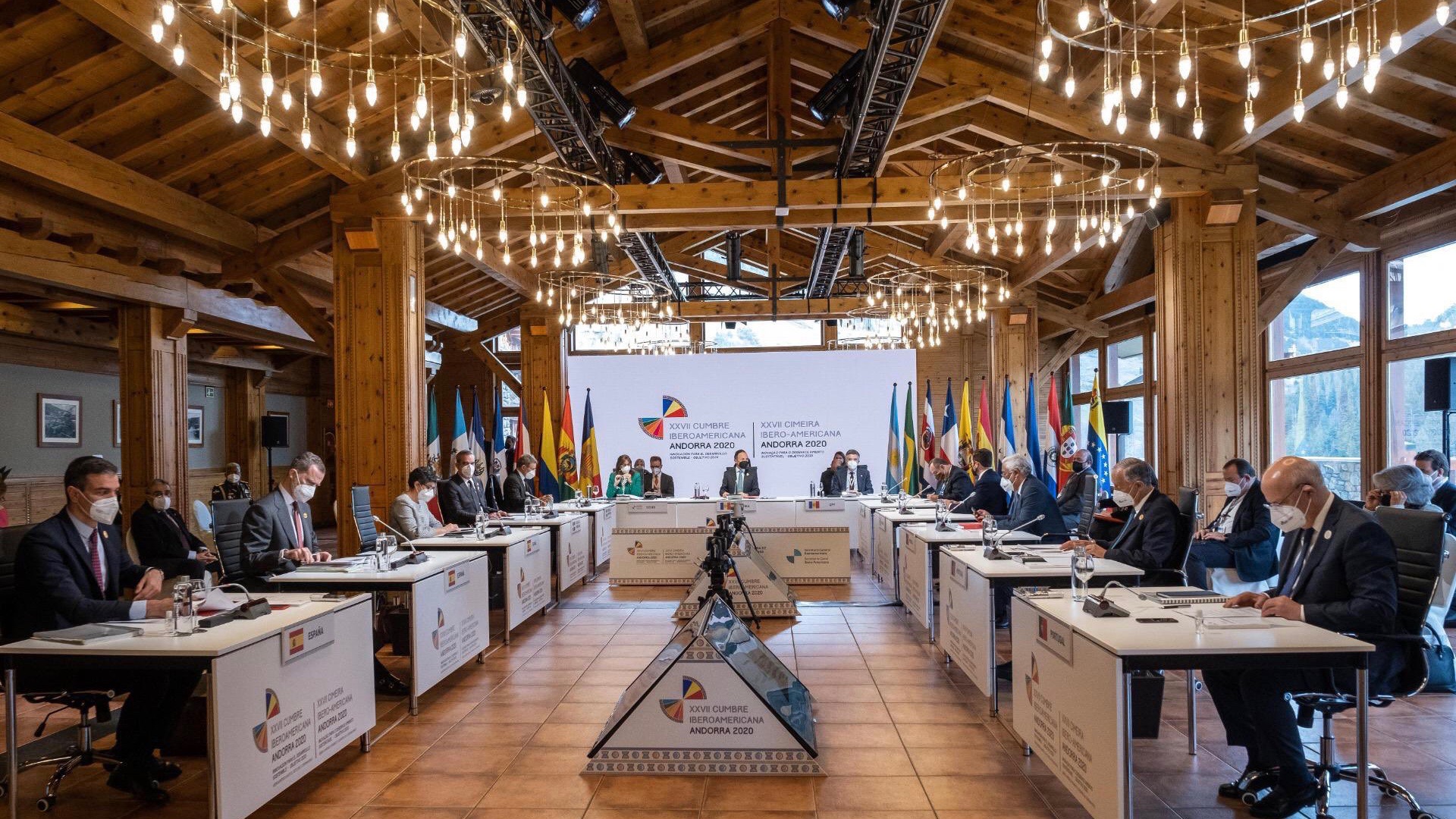The 27th Ibero-American Summit of Heads of State and Government was held on April 21 in Andorra in a semi-virtual format. The meeting focused on formulating common responses to the economic, social and health issues generated by the pandemic as well as solutions to global problems such as climate change.
Due to the COVID-19 pandemic, the leaders of only four of the 22 member countries traveled to Andorra to join the event in person: Spain and Portugal due to geographical proximity, Guatemala because the previous pro-tempore secretariat of the organization was located there, and the Dominican Republic because the next headquarters of the body will be situated there.
The presidents and vice-presidents of the rest of the Latin America and the Caribbean countries, namely Argentina, Bolivia, Brazil, Chile, Colombia, Costa Rica, Cuba, Ecuador, El Salvador, Honduras, Mexico, Nicaragua, Panama, Paraguay, Peru, Uruguay and Venezuela, attended the meeting virtually with the help of video conferencing. The encounter was originally scheduled for November 2020, but was postponed due to the pandemic.
During the conference, Argentine President Alberto Fernández and Bolivian President Luis Arce, criticized the unequal distribution of anti-COVID-19 vaccines, their monopolization by rich countries, and advocated for universal, equitable and fair access to vaccines for all the nations on a non-profit basis. The leaders called for rapid and flexible international financing as well as debt relief for low and middle-income countries in the region in these tough times.
Additionally, Bolivian President Arce called to reconsider international relations on humanitarian basis in the time of the pandemic. Argentine President Fernández called to strengthen multilateralism and integration in economic recovery and deepen the exchange of technologies without exclusions.
Cuban President Miguel Díaz-Canel condemned the impacts of the commercial, economic, and financial blockade imposed by the US against Cuba on the development of the nation and its people. However, he highlighted the advances in science, technology and innovation in the country, and reminded to immunize the entire population by the end of the year with its own drugs The head of the state called for a united Ibero-America in the face of inequalities and the current world economic crisis, and reiterated Cuba’s willingness to share its scientific and innovation experiences with humankind for the sustainable development of all.
Venezuelan Vice-president Delcy Rodríguez also rejected the unilateral coercive measures imposed by the US against Cuba, Nicaragua and Venezuela. Rodríguez called to eliminate inequalities and strengthen cooperation between countries in the fight against the pandemic. She also urged the Portuguese authorities to open spaces for dialogue and collaborate in the release of financial resources of the Venezuelan State blocked in the banking institutions of the European nation.
Chilean President Sebastián Piñera asked to take advantage of the scientific and technological advances and move towards more sustainable consumption patterns. He called to strengthen the WHO and the integration and commitment to cooperation to face and overcome future pandemics.
Colombian President Iván Duque, Costa Rican President Carlos Alvarado, Dominicanan President Luis Abinader, Ecuadorian President Lenín Moreno, Panamanian President Laurentino Cortizo, Uruguayan President Luis Lacalle Pou, denounced the inequality in accessing vaccines and urged for better cooperation and more supportive relations at the global level to face the pandemic.
Mexican Foreign Minister Marcelo Ebrard, on behalf of President Andrés Manuel López Obrador, vowed to guarantee anti-COVID vaccine, which the country will be producing, to all member countries equally. The head of the Spanish Government, PM Pedro Sánchez, also announced that his country would provide the region with vaccines as soon as possible, although he didn’t specify the amount of doses.
Prime Minister of Andorra Xavier Espot also offered to share the country’s experiences and specificities in areas such as education, the inclusion of people with disabilities, among other aspects, for social equality.
The Organization of Ibero-American States (OEI) is an international organization made up of 22 Spanish and Portuguese-speaking countries of Latin America and Europe, in addition to Catalan speaking Andorra. It was founded in 1949 as a mechanism to promote intergovernmental cooperation among its member nations in the fields of education, science, technology and culture.





